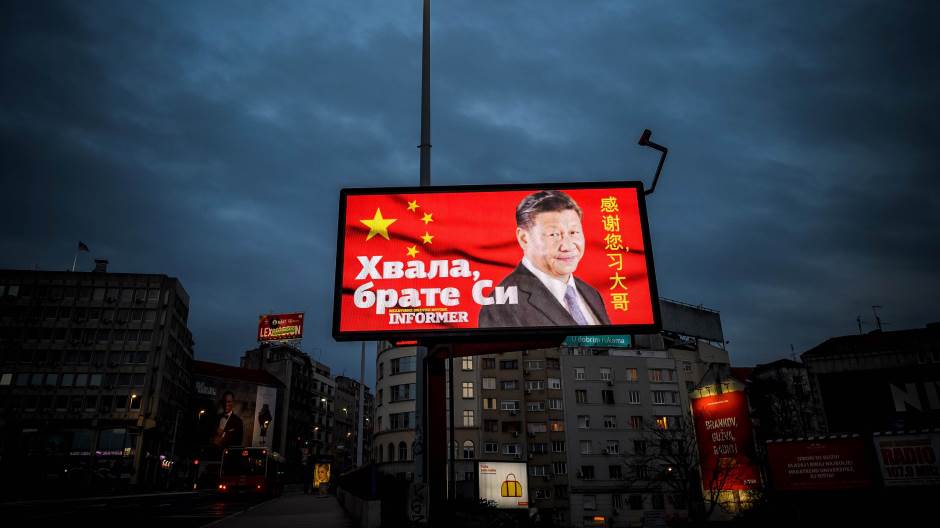When Serbia’s ruling Progressive Party came to power back in 2012, its leaders were very clear in its party’s pro-European orientation, to such an extent that a significant part of their nationalist conservative supporters started questioning their choice. Soon enough, the priorities were changed because of the party’s approval ratings. Lately, and especially during the epidemic, Serbians could notice not only the rise of authoritarianism in their country’s governmental regime but also the ties of President Vučić with the leaders of other authoritarian regimes, his so-called ‘brothers’.
The regime sprints into action when one of Serbia’s ‘brothers’ decides to honour us with a visit. They gather people to greet the visitor, always with banners and flags. The idea is that this looks spontaneous, as if the masses were dying to greet Erdoğan, Putin or Orban. Of course, the visitors act as if they didn’t know that those people are collected by buses from all over Serbia, and came there under the threat of losing their job (in both the public and the private sector), or that they were simply paid ten Euros and given a sandwich. As if those autocratic leaders weren’t doing the same at home.
With the first cases of coronavirus in Serbia, the leadership started with daily press conferences. Early in the crisis president Vučić started praising our Chinese brothers, even before any help was sent. When China promised the first package of help, the president pointed out that they are the only ones who can help us, since, once again, the European solidarity has proven to be nothing but ‘a tale for children’. Whenever the Chinese airplane would land, Vučić would be there, along with his army of media, to seal the “steel friendship” with a kiss on the Chinese flag. In only a matter of days Belgrade was filled with billboards saying “Thank you, brother Xi, you are the only one to help us.” This propaganda is both signed by the pro-regime tabloids and paid for by the taxpayers’ money.
On the other hand, the EU, who sent significantly more help both for immediate use and post-crisis recovery, was not even given public recognition. Not before the EU’s foreign affairs chief, Josep Borrell noticed that “it’s funny how only China receives billboards of gratitude in Serbia.” One might notice that it’s also funny how well it was covered by the media that doctors sent as help from China paid a visit to the mausoleum where the former Yugoslavia’s communist dictator Tito is buried. Someone could also ask whether this“know-how”, which our president asked the Chinese experts for, concerns only the health aspect of handling the crisis.
Serbia has, amid the pandemic, been paid some political visits. On the 6th of May, Turkey’s president Erdoğan was in Belgrade, and while the visit was thoroughly covered by the media, some agreements were signed. Of course, one would think those agreements had to do with cooperation in dealing with the pandemic, which was at that moment perceived as a threat dangerous enough to implement curfews that lasted for days and get the military on the streets in both countries. Well, not really – it had to do with security, but with military and police cooperation. The latter was an addition to last year’s agreement on joint police patrolling that allowed the deployment of Turkish police on Serbian soil, in case any critic of president Erdoğan happened to wander all the way to Serbia, I suppose.
Another visit that president Vučić made sure was thoroughly covered by the media was that of Hungary’s prime minister Orban, the most criticized leader in Europe for the way he used the pandemic to grasp more power. That’s why the Serbian president found it was important to make it clear: “There is no way I will say anything negative about Hungary’s prime minister only to get support from the liberal left European circles or some points in the foreign press.”
On the 15th of May, when the visit took place, they were both proud to point out that their “victory in the first battle with the coronavirus was achieved in democratic conditions”. It must have been this version of democratic conditions that the two leaders had in mind that took both Serbia and Hungary from being qualified as semi-consolidated democracies to be recognized as hybrid regimes in the Freedom House’s latest ‘Nations in Transit’ report.
As we’re approaching the elections scheduled for the 21st of June, this kind of ‘showing off’ in relationships with other countries and using the party’s government position works like a charm for getting the support of the voters, who can follow the show in numerous pro-regime media. The populist president bursting with confidence while all those, more than questionable, leaders are patting his back gives a sense of security to his voters. In the meantime, our road to becoming a member of the EU is getting increasingly slippery, and it doesn’t seem that we will be letting go of the Chinese bait we took anytime soon.
Featured Image avaliable at: https://www.theguardian.com/world/2020/apr/13/coronavirus-diplomacy-how-russia-china-and-eu-vie-to-win-over-serbia
